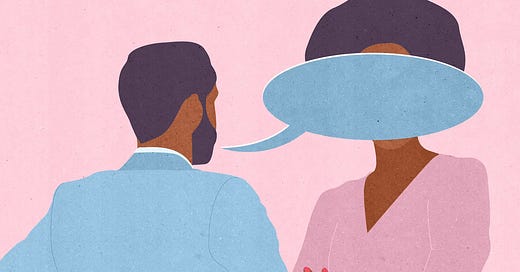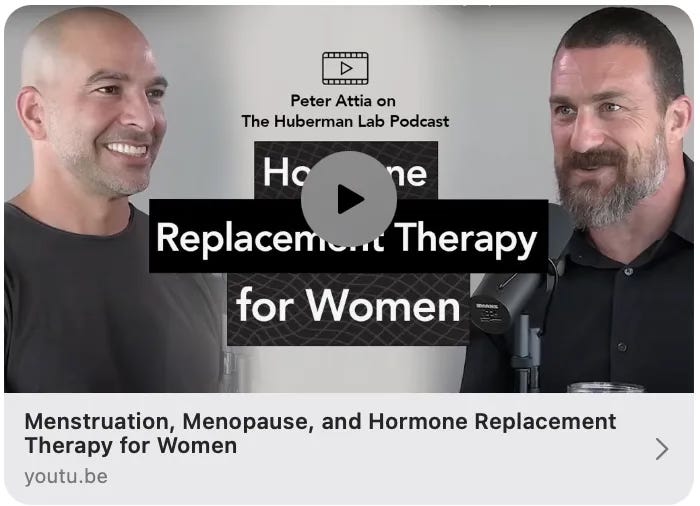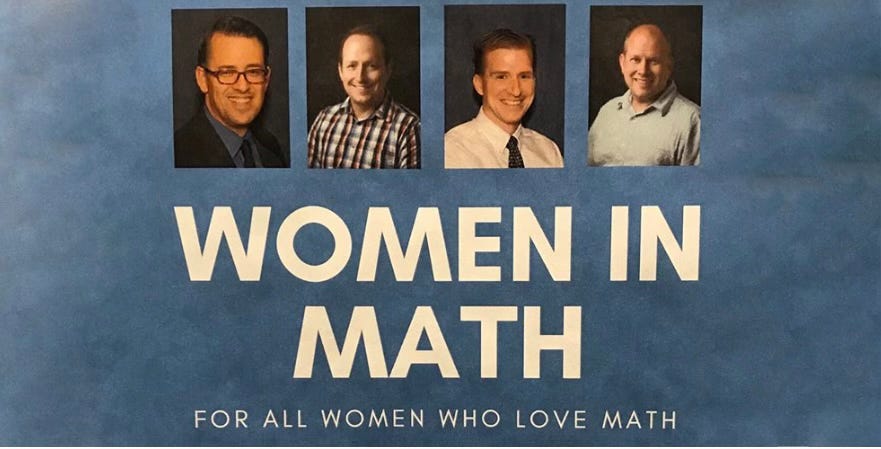Respect for manthority: Knowledge is power, unless you’re a woman
Why the gender bias against women experts is harmful and how we can all do our part to fix it
After a 20 year career in public relations, I founded the largest, women-led volunteer organization in the nation, which made me consider myself an expert in at least a few things; among them, organizing, policy, activism, politics, elections, communications, cultural campaigns, media relations, social media... But what I came to realize during the 11 years that I led Moms Demand Action was that, as a woman, I could never know enough to actually be called an expert.
Time and again, I was passed over – by media, conferences, panels, speakers’ bureaus, think tanks, academic institutions – in favor of “manthorities” (young and old, but mostly white) who didn’t have anywhere near the same experience and knowledge I did. I was never asked to give a TED Talk. I was never invited to the Aspen Ideas Festival (even as other male leaders in the movement were). With the exception of MSNBC, I was never interviewed during primetime on an evening news program. And I was only invited once to appear on a Sunday morning talk show.
Did I mention that I founded the largest, women-led volunteer organization in the nation?
There are many, many examples of how my expertise was devalued over the years, but this one experience summarizes them all pretty well: a couple of years ago, I carved several hours out of my busy schedule to educate the host of a weekly news/comedy show for an upcoming episode he was creating about domestic gun violence. When the episode eventually aired, I was gobsmacked to see that it included a discussion among an all-male panel of gun safety policy “experts.” Afterward, when I voiced my frustration about the lack of female representation, I was told that women were featured… as the victims.
I’ve heard so many similar stories from women during the interviews I’m conducting for a book I’m working on (out in 2025 — stay tuned!).
, a developmental psychologist with nearly two decades of experience of teaching and treating patients, told me that since the release of her new book “The Five Principles of Parenting,” she has yet to be interviewed by a single man. To be clear, Aliza’s book isn’t solely about mothering, it’s about the developmental science of parenting. “I have a PhD, I'm on faculty at a major institution, I'm an expert in my field, I have a New York Times bestseller, and yet I’ve never had a man ask me a question in public.” , an author and political analyst, told me that when she worked at CNN, men with less knowledge were invited on air to discuss a whole host of issues — from immigration to health care — while she was typically asked to weigh in on "women's issues," like women's rights or other political, but not policy, issues. But the bias didn’t end there: Kirsten said that as male experts age on-air, they’re considered “wise men,” but women are rarely afforded that same stature. “I used to live on the manels, and I was often the only woman there. And then I was let go at age 56; I'm frankly shocked I made it as long as I did.”And Devereaux Peters, a first round WNBA pick in 2012 who helped her team win a league championship, told me that during her career, men “constantly” came up to her and said things like, “I know I could beat you if we played one on one.” And now that Deveraux is retired and starting a new career in real estate development — a male-dominated industry — she said she’s come to realize that manthorities are everywhere. “No matter how hard you're working at something or how good you are at it, there’s a man somewhere who thinks they know more than you do.”
This manthority phenomenon has been explored in depth by author and podcaster
(who also hasn’t been interviewed by a man yet about her recent bestselling book) in a series of brilliant essays about how society defers to male experts, even on issues related to women. Elise proves her point with an audit of highly rated, male-run podcasts, many of which also have large audiences of women. While Elise’s findings aren’t surprising, they are depressing: of Sam Harris’s 376 episodes, he’s hosted fewer than 60 women; of Tim Ferriss’s 700 episodes, he's platformed fewer than 100 women; of Dr. Peter Attia’s 300 episodes, he’s only interviewed 28 women; and during his two years as a weekly podcast host, Andrew Huberman has only interviewed 12 women. TWELVE! And women make up half of his audience.Why is this problematic? Because when we elevate male experts over and over again, we reinforce the falsehood that only men are worth listening to, and that women exist simply to assist men with their important work. We deprive women of the recognition and praise they deserve and would get if they were men, which also devalues women’s sense of worth. It becomes a vicious circle: when women’s expertise is ignored, they become less confident about their expertise and less willing to take risks publicly. Meanwhile men, many of whom suffer from something called an “overconfidence bias,” are more likely to be bold when speaking, even when they’re wrong. So it’s no wonder that women are seen as being too cautious while men are viewed as more compelling or quotable. Repeat ad nauseam…
At times, we’re all — including women — guilty of believing men know what they’re talking about until proven otherwise and assuming women don’t know what they’re talking about until proven otherwise (I would refer you to all of the gender-based conversations about the Vice President). That’s in part because it becomes such a normal occurrence in our everyday lives that we stop noticing it. As Elise writes here, “…we are woefully out of balance: Women’s voices need to come up, men’s voices need to be dialed down. This will require courage on the part of women, and sacrifice on the part of men — and a willingness to change our listening patterns from all of us.”
Here are some ways to start recognizing and shifting these patterns:
Pay attention to your own biases
Tackling the authority gap starts with seeing it for what it is and becoming aware of how we are perpetuating it. Notice if you're interrupting women more than men, or if you're listening less attentively to them at meetings. If negative stereotypes come to mind when you're thinking about a woman in authority, ask yourself if that feeling is telling you more about yourself than her. And be sure you’re reading, watching and listening to women when and where you can.
Practice self-promotion
Studies show men are more likely than women to be seen as “brilliant” – by both themselves and others. So it’s no surprise that women are underrepresented in careers where success depends on high levels of intellectual ability (eg, brilliance), including science and technology. At the same time, women often face higher social penalties for self-promotion. Make a plan to claim your own expertise and brilliance and then share it with the world. If you ever doubt your expertise or brilliance, go spend some time at your statehouse (80 percent of state lawmakers are men and too many of them do not appear to be experts…).
Lift up women experts
It’s common knowledge that women are underrepresented among high-profile positions such as CEOs of Fortune 500 companies (95 percent men), US senators (80 percent men), or US presidents (100 percent men). Men also dominate the senior ranks of policy and research roles at think tanks, universities, and federal agencies. The reason men are viewed as experts more than women are is because men are so much more likely to be in positions of authority. This is why your work to support women — publicly and privately — is so important. Take practical daily steps to verbally endorse, champion, advocate and encourage women. Same goes for men; deferring to women leaders is an intentional and powerful way for male leaders to spend their privilege.
Call it out
Demand expert parity when possible. We should all be (nicely) calling out the media, conferences, organizations, etc for repeatedly elevating male experts over women. For example, I was listening to an episode of Derek Thompson’s podcast “Plain English” this week and when Derek referred to a scientific theory, the male scientist he was interviewing interrupted him to name the woman who had actually come up with the theory in the first place. It would have been better if Derek were interviewing that woman expert to begin with, but naming women as experts is a start. There’s no harm in emailing, tweeting, calling and direct messaging podcast hosts, reporters, conferences, etc, to suggest/demand women experts when they’re lacking.
The bottom line is that if women agree to stay small — if we allow men to set the strategy and take the spotlight (especially on women’s issues) — we’ll continue to be passed over as experts. Discussing the prevalence of manthorities, working to correct the asymmetry, and then claiming our own expertise (while also lifting up other women experts whenever possible) is key to bringing male and female voices into balance.
Now I want to hear from you: how have you experienced manthorities? How have you noticed or worked to correct the imbalance? What have you done to promote your own or other women’s expertise? Do you see this as a generational issue that’s changing for the better, or are we doomed until there’s parity?








Yep! Just served on a jury where the women were constantly talked over and mansplained to. (The case was a man who had violently assaulted a woman half his size and detained her against her will.) There were four women (including me) and eight men on the jury. We four women (and about four of the men) would not BUDGE on a guilty verdict, and we were able to pull the others to our side. Stay strong, ladies! It's brutal out there.
I’m not really sure if it’s getting any better. I have spent over 20 years in Engineering and although I am an expert in my field I was never treated that way by any men in leadership positions. They took credit for my work and my ideas, promoted men over me, asked other men what the answers were because they didn’t believe me. And it wasn’t even just those above me, it was also my male peers that for some reason thought that because they were male it gave them an automatic jump ahead of me. I came to realize that I was smarter than the majority of them but unfortunately I didn’t have the machine behind me like they did. I’m hoping something changes for my daughters.